
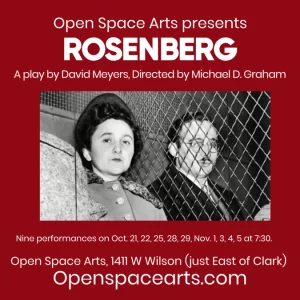 *** “Rosenberg” is a play that concerns itself with whether Julius and Ethel Rosenberg were spies who leaked highly classified documents about the atomic bomb to the Soviets after World War II. Yet the title is somewhat of a misnomer, since the story is much less about the Rosenbergs, per se, than it is about (the fictional) Sam Goodstein (Dustin Rothbart), who led the Justice Department’s prosecution of the case against them for treason. At the onset of the performance, we learn via a radio broadcast that the couple has been found guilty of their crimes, but they have not yet been executed. Yet had it not been for my previous familiarity with the personalities and events of the era, I would have been totally lost in the deluge of names and circumstances being announced on the radio. Immediately afterwards, we see a couple on stage, who I initially thought must be Julius and Ethel at an earlier point in time, prior to their incarceration. But I was wrong. Only after some dialogue between the two about their personal lives do we come to realize that they are actually Sam Goodstein and his wife Judith (Sonya Robinson). We learn that while Sam was working as a lawyer on the prosecution’s team, Judith has been attending medical school, studying to become a doctor.
*** “Rosenberg” is a play that concerns itself with whether Julius and Ethel Rosenberg were spies who leaked highly classified documents about the atomic bomb to the Soviets after World War II. Yet the title is somewhat of a misnomer, since the story is much less about the Rosenbergs, per se, than it is about (the fictional) Sam Goodstein (Dustin Rothbart), who led the Justice Department’s prosecution of the case against them for treason. At the onset of the performance, we learn via a radio broadcast that the couple has been found guilty of their crimes, but they have not yet been executed. Yet had it not been for my previous familiarity with the personalities and events of the era, I would have been totally lost in the deluge of names and circumstances being announced on the radio. Immediately afterwards, we see a couple on stage, who I initially thought must be Julius and Ethel at an earlier point in time, prior to their incarceration. But I was wrong. Only after some dialogue between the two about their personal lives do we come to realize that they are actually Sam Goodstein and his wife Judith (Sonya Robinson). We learn that while Sam was working as a lawyer on the prosecution’s team, Judith has been attending medical school, studying to become a doctor.
Although Julius and Ethel are mentioned throughout, we never see them or hear from them. Instead, the story has more to do with them as a point of focus, analogizing the relationship that they may have had with each other to Judith and Sam’s relationship. In part, this is a story that asks whether a husband and wife are likely to share confidences with each other or not—and under what circumstances. In fact, what the script does well is postulate the idea that there might be secrets between husband and wife, so it is very possible that Ethel did not know everything that Julius did when he betrayed the United States. In this new play by David Meyers, directed by Michael D. Graham, you will learn why Goodstein is beginning to have his doubts about Ethel’s culpability.
What is best about the play is that it deals with how each character feels differently about the relationship between law and justice. For example, Sam’s paralegal Dorothy (Delysa Richards) is a black woman at a time when African Americans had a difficult time achieving more highly responsible and highly paid positions in the corporate world. Dorothy is more than just a secretary to Sam and wants to do an excellent job; she is in love with the law in order to seek the truth and obtain social justice. In contrast, Sam’s friend and fellow lawyer Robert (Scott Sawa) believes in using the law to pursue what the general public would want in order to hold everyday society together and promote social order: not an unreasonable perspective for a prosecuting attorney. However, while Robert is not interested in examining any new evidence about the Ethel Rosenberg case, Sam is torn about what to do next. When Sam questions his own judgment and succumbs to his fears, this turns a story combining his professional life and domestic life into a more complicated psychological drama and “Theatre Noir”, mimicking the post-war “Film Noir” genre.
That said, the presentation could have been made much scarier by having more things go haywire in Sam and Judith’s apartment. In addition to having the telephone ring incessantly with nobody on the other end of the line, there should have been moments of total darkness and flickering lights and unusual sound effects to signify the grave danger being faced by all. But first a shout-out to props designer Lauren Ramos who did a wonderful job furnishing the set; I especially loved the huge original abstract painting that takes up most of the wall. Costumes by Patti Roeder are very authentic and perfectly suited to the production; Judith’s V-necked tan dress is particularly lovely.
To my mind, the script could have dug a bit more deeply into the history of the early 1950s regarding the anti-Semitism of the era, the Red Scare, and Senator Joseph McCarthy’s pursuit of Communist sympathizers at a time when a number of people were trying to construct a link between Communism, immigrants, and the Jews. Some of this is hinted at during the course of the play and made all the more evident during the show’s climax (with the mention of two Jews on the prosecution team, Roy Cohn and G. David Schine). Yet the script for the most part tends to focus on the microlevel: about what will people do in the name of obtaining personal success—and what can happen when ambition and lust for power and influence get in the way of the pursuit of truth and justice. We also see what can happen when people become scared for their lives. To what extent will they compromise their principles when their safety, security, and style of life are being threatened?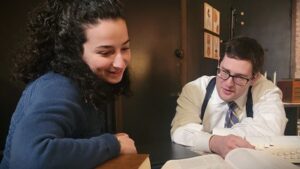
The title “Rosenberg” (together with the famous photograph of the imprisoned couple) draws in likely audience members who are already familiar with this chapter in U.S. history or who want to learn more about it. While the show is good, my expectations about it were all misplaced. I wanted to see portions of the well-known trial or perhaps witness some private conversations between Ethel and Julius explaining how they acquired closely guarded government secrets and what they did (or did not do) with them. Who really passed them along to the Soviets and why? Was Ethel set up to take the fall for something she did not do? But none of this is what the current production is about. A more apt title could hint at what might have gone on behind the scenes of the trial and its aftermath. This is essential to lend more power and credence to the overall story.
“Rosenberg” is playing through November 5, 2023, at Open Space Arts, 1411 W. Wilson Avenue, in Chicago.
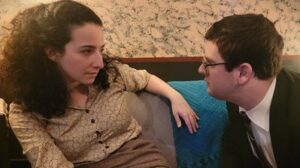 Tickets are: $25 each.
Tickets are: $25 each.
There are only nine performances: October 21, 22, 25, 28, 29 and November 1, 3, 4, 5.
All at 7:30 p.m.
To purchase tickets, visit: https://www.goelevent.com/OpenSpaceArts/e/Rosenberg.
For more information about this show, go to: https://openspacearts.com/2023/10/04/rosenberg/.
For more information about Open Space Arts and for a list of their other offerings, visit: https://openspacearts.com/.
To see what others are saying, visit www.theatreinchicago.com, go to Review Round-Up and click “Rosenberg”.


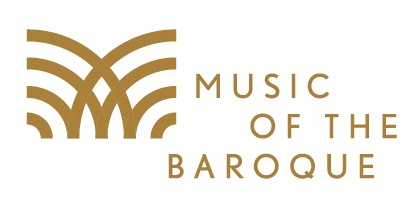

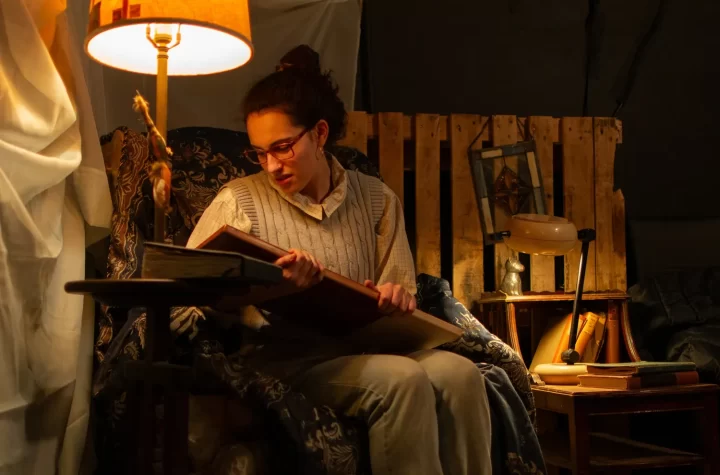

More Stories
“The Berlin Diaries” reviewed by Julia W. Rath
“Legally Blonde: The Musical”
Teatro ZinZanni Chicago “Love Chaos and Dinner”.